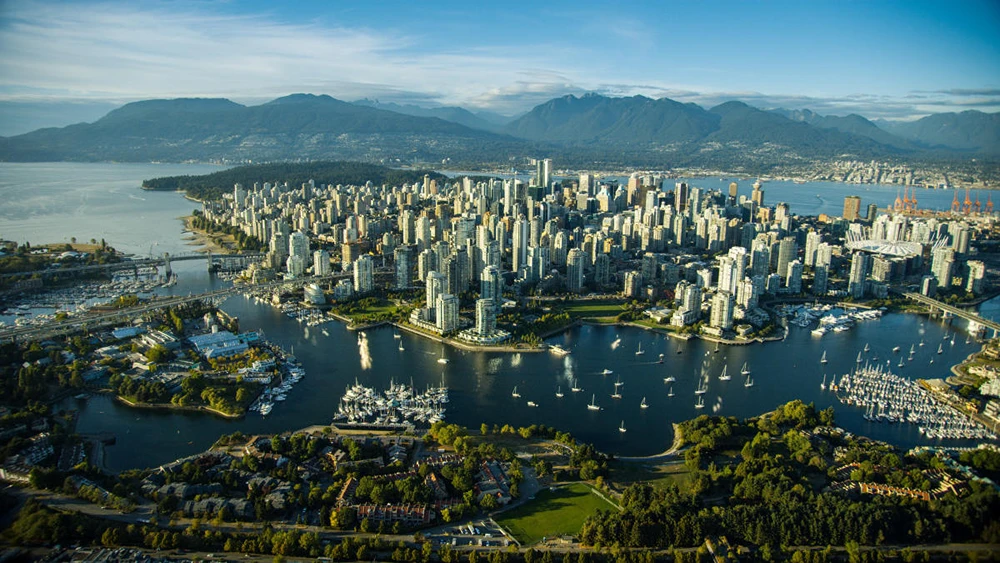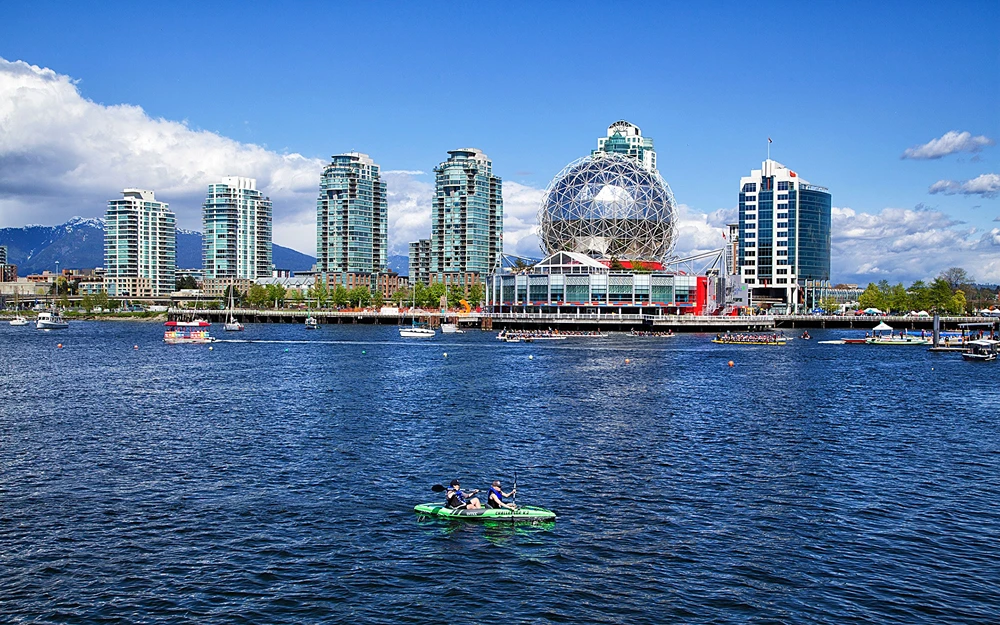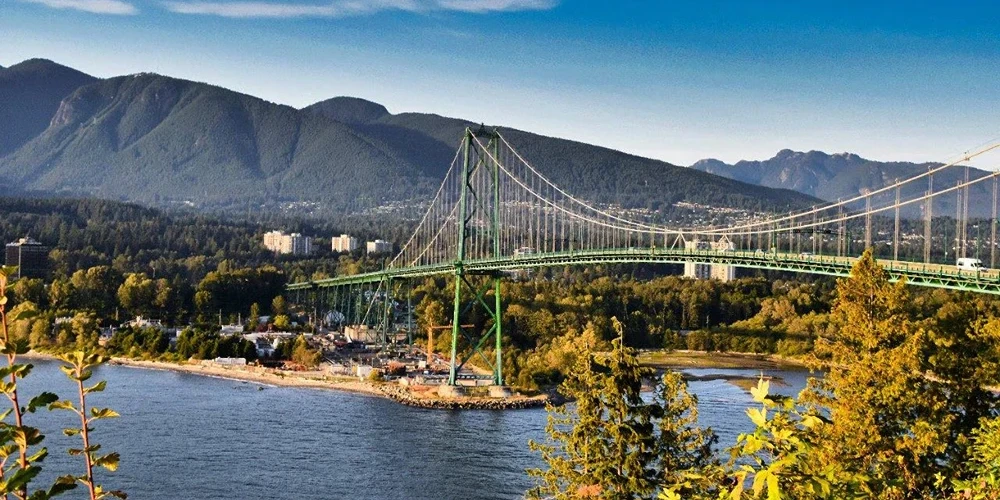Key Highlights:
- Location: Southwest coast of British Columbia, Canada
- Population: Approximately 2.5 million in the metro area
- Climate: Mild by Canadian standards, with wet winters and dry summers
- Nickname: “Hollywood North” due to its thriving film industry
Vancouver consistently ranks as one of the world’s most livable cities, offering visitors a wealth of experiences from pristine nature to world-class dining and cultural attractions.
Travel Resources
To help you plan your perfect trip to Vancouver, here are some essential resources:
- Flights: Find affordable flights to Vancouver International Airport (YVR) using our flight comparison tools.
- Insurance: Secure comprehensive travel insurance to protect against unexpected events.
- Car Rental: Book a rental car for flexibility in exploring Vancouver and its stunning surroundings.
- Tours: Discover guided tours showcasing Vancouver’s natural beauty, cultural highlights, and hidden gems.
- Packing: Use our Vancouver-specific packing checklist to ensure you’re prepared for the coastal climate and various activities.

Some History First
Vancouver’s history is a rich tapestry of indigenous heritage and multicultural development.
Key Historical Points:
- Pre-colonial era: Home to Coast Salish peoples for thousands of years
- 1792: First European exploration of the area by Captain George Vancouver
- 1867: “Gassy Jack” Deighton opens a saloon, establishing the core of the future city
- 1886: City of Vancouver is incorporated
- 1887: Canadian Pacific Railway reaches Vancouver, spurring rapid growth
- 1986: Vancouver hosts the World Exposition (Expo 86)
- 2010: Vancouver hosts the Winter Olympics and Paralympics
Today, Vancouver honors its indigenous roots while embracing its status as a global city of the future.
Vancouver Today
Modern Vancouver is a dynamic, diverse city that balances urban sophistication with easy access to nature.
Notable Aspects of Contemporary Vancouver:
- Cultural Diversity: Home to vibrant communities from around the world
- Environmental Leadership: Consistently ranked as one of the greenest cities globally
- Tech Hub: Growing center for technology and startups
- Film Industry: Major location for film and television production
- Outdoor Paradise: Offers skiing, hiking, and water activities within city limits
Is Vancouver Safe?
Vancouver is generally considered a safe city for residents and tourists alike, with a relatively low crime rate compared to other major North American cities.
Safety Tips:
- Exercise normal precautions as you would in any urban environment
- Be aware of petty theft in tourist areas and on public transportation
- Avoid walking alone in Stanley Park at night
- Be cautious in the Downtown Eastside area, especially after dark
- In outdoor areas, be aware of wildlife, particularly bears in North Shore trails
Emergency Services: Dial 911 for police, fire, or medical emergencies
Where is Vancouver?
Vancouver is strategically located on Canada’s west coast, offering easy access to both urban amenities and natural wonders.
Geographical Details:
- Coordinates: 49°15′N 123°6′W
- Area:97 km² (44.39 sq mi)
- Terrain: Coastal seaport city bordered by mountains and sea
Nearby Attractions:
- Whistler: About 2 hours north (world-renowned ski resort)
- Victoria: About 1.5 hours by ferry (capital of British Columbia)
- North Shore Mountains: Immediately north of the city (hiking and skiing)
Latest Articles
From The Area
Nothing found.
What is the Best Time to Visit Vancouver?
Vancouver’s climate is mild compared to much of Canada, but each season offers its own unique charm.
Seasonal Highlights:
- Summer (June-August):
- Pros: Warm temperatures, outdoor festivals, best time for hiking
- Cons: Peak tourist season, higher prices
- Fall (September-November):
- Pros: Mild temperatures, beautiful fall colors, fewer crowds
- Cons: Increasing rainfall
- Winter (December-February):
- Pros: Mild winters by Canadian standards, nearby skiing and snowboarding
- Cons: Frequent rain, shorter daylight hours
- Spring (March-May):
- Pros: Cherry blossoms, warming temperatures, awakening nature
- Cons: Still quite rainy, can be chilly
Best Time to Visit: For most travelers, late spring to early fall (May to September) offers the best balance of pleasant weather and outdoor activities.
How to Get to Vancouver & Around
Vancouver is well-connected and easy to navigate, whether you’re arriving from abroad or exploring the city itself.
Getting to Vancouver:
- By Air: Vancouver International Airport (YVR) serves numerous domestic and international flights
- By Train: VIA Rail and Amtrak provide service to Vancouver
- By Car: Trans-Canada Highway (Highway 1) connects Vancouver to the rest of Canada
- By Cruise: Vancouver is a major cruise ship port, especially for Alaska cruises
Getting Around Vancouver:
- Public Transit: TransLink operates an extensive network of buses, SkyTrain (light rail), and SeaBus
- Cycling: Vancouver is very bike-friendly with numerous bike lanes and rental options
- Walking: Many attractions in downtown and surrounding neighborhoods are within walking distance
- Taxis and Ride-sharing: Readily available throughout the city
Tip: Consider purchasing a Compass Card for easy use of public transportation.
Things to Do in Vancouver
Vancouver offers a wide array of attractions and activities for visitors of all interests.
Must-Visit Attractions:
- Stanley Park: 1,000-acre urban park with beaches, walking trails, and the Vancouver Aquarium
- Granville Island: Vibrant neighborhood known for its public market and arts scene
- Capilano Suspension Bridge Park: Featuring a thrilling suspension bridge over a canyon
- Grouse Mountain: Offers panoramic views of the city and outdoor activities year-round
- Gastown: Vancouver’s oldest neighborhood, known for its steam clock and Victorian architecture
Outdoor Activities:
- Hiking: Numerous trails in the North Shore mountains
- Skiing/Snowboarding: Cypress, Grouse, and Seymour mountains are within city limits
- Kayaking/Paddleboarding: In False Creek or Deep Cove
- Beaches: Kitsilano, English Bay, and Spanish Banks offer urban beaches
Cultural Experiences:
- Museum of Anthropology: Showcasing First Nations art and culture
- Vancouver Art Gallery: Largest art museum in Western Canada
- Science World: Interactive science museum in a distinctive geodesic dome
- Vancouver Lookout: Observation deck offering 360-degree views of the city
Where To Stay In Vancouver
Vancouver offers a wide range of accommodations to suit every budget and preference.
Popular Areas to Stay:
- Downtown: Ideal for first-time visitors, close to many attractions
- Kitsilano: Beachside neighborhood with a laid-back vibe
- Yaletown: Trendy area known for its restaurants and nightlife
- West End: Quiet neighborhood close to Stanley Park and beaches
Accommodation Types:
- Luxury hotels
- Boutique hotels
- Budget-friendly hostels
- Vacation rentals
- Bed and breakfasts
Tip: Book in advance if visiting during peak summer months or major events.

What To Eat In Vancouver
Vancouver’s culinary scene reflects its multicultural population and access to fresh, local ingredients.
Must-Try Local Specialties:
- Fresh Seafood: Particularly salmon and spot prawns
- Sushi: Vancouver is renowned for its high-quality sushi
- Japadog: Japanese-style hot dogs
- Nanaimo Bars: A sweet treat originating from Vancouver Island
- Craft Beer: Vancouver has a thriving craft brewery scene
Notable Dining Areas:
- Gastown: Hip restaurants and cocktail bars
- Richmond: Authentic Asian cuisine, especially Chinese
- Commercial Drive: Diverse international options
- Granville Island Public Market: Fresh local produce and prepared foods
Tip: Don’t miss trying the “Vancouver Special” sushi roll, a local favorite.
Entry & Exit Requirements
Visitors to Vancouver must comply with Canadian immigration regulations.
Key Requirements:
- Valid Passport: Required for all international visitors
- eTA or Visa: Electronic Travel Authorization (eTA) required for visa-exempt foreign nationals flying to Canada. Others may need a visitor visa.
- Length of Stay: Typically up to 6 months for tourists
- Proof of Funds: May be required to show you can support yourself during your stay
- Return Ticket: May be asked to show proof of intention to leave Canada
Note: Requirements can change. Always check the official Government of Canada website for the most up-to-date information.
What To Pack For Your Trip
Vancouver’s weather can be variable, so packing adaptable clothing is key.
Essential Items:
- Layered Clothing: Weather can change quickly, especially near the water
- Rain Jacket: Vancouver is known for its rainfall, especially from October to March
- Comfortable Walking Shoes: Vancouver is a great city to explore on foot
- Outdoor Gear: If planning on hiking or other outdoor activities
- Swimwear: For beaches or hotel pools
- Camera: To capture Vancouver’s stunning scenery
- Sunglasses and Sunscreen: Even on cloudy days, UV protection is important
Tip: If visiting in winter and planning to ski, you can rent equipment rather than bringing your own.
Remember to check current local guidelines and restrictions before your trip, as they may affect your travel plans and experiences in Vancouver.
FAQs
Check the Government of Canada’s official website to determine if you need a visa based on your nationality.
Experience outdoor adventures like hiking, biking, kayaking, and skiing in Vancouver and its surrounding mountains and waterways.
Yes, Vancouver offers numerous family-friendly attractions and activities, including parks, museums, and wildlife encounters.


